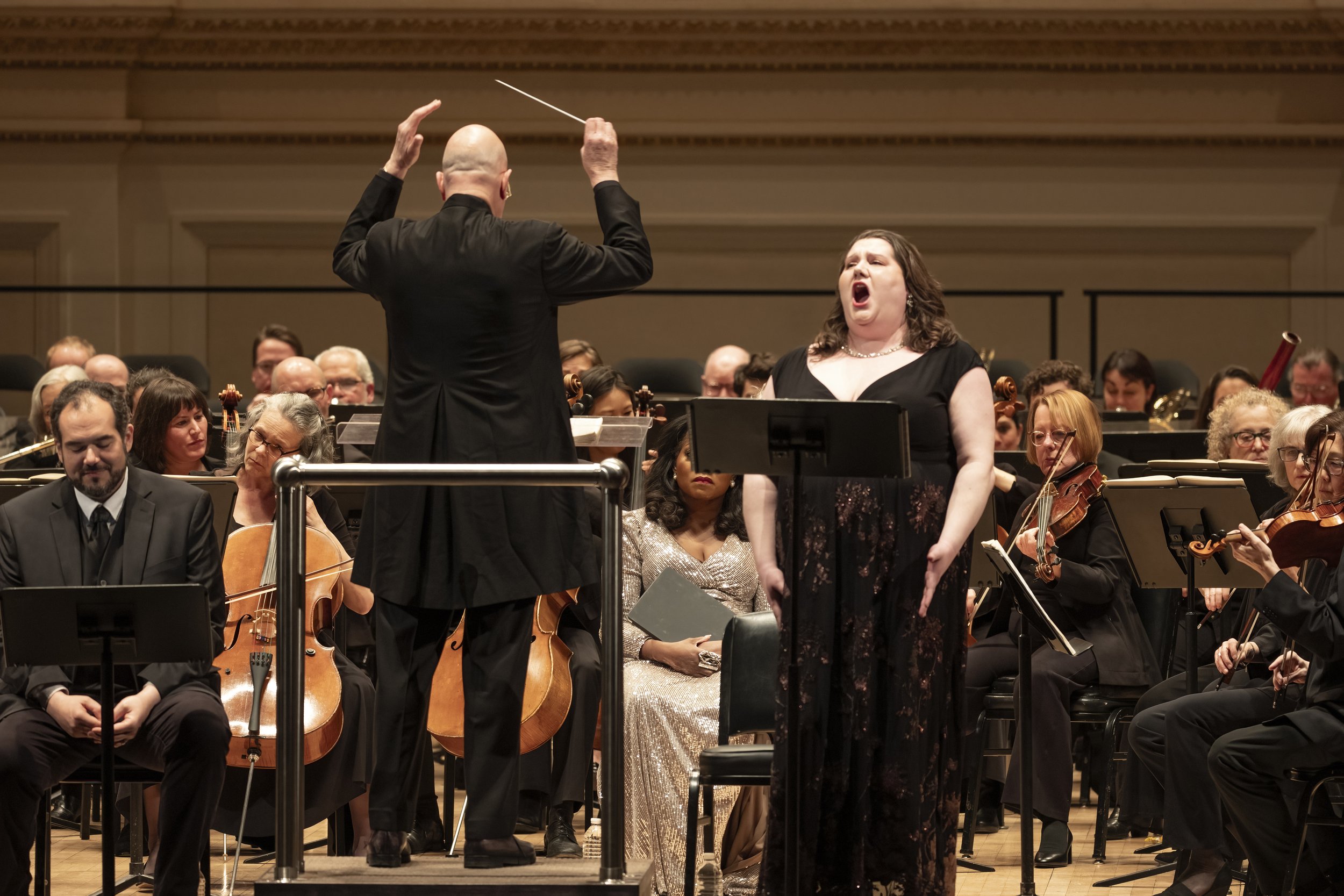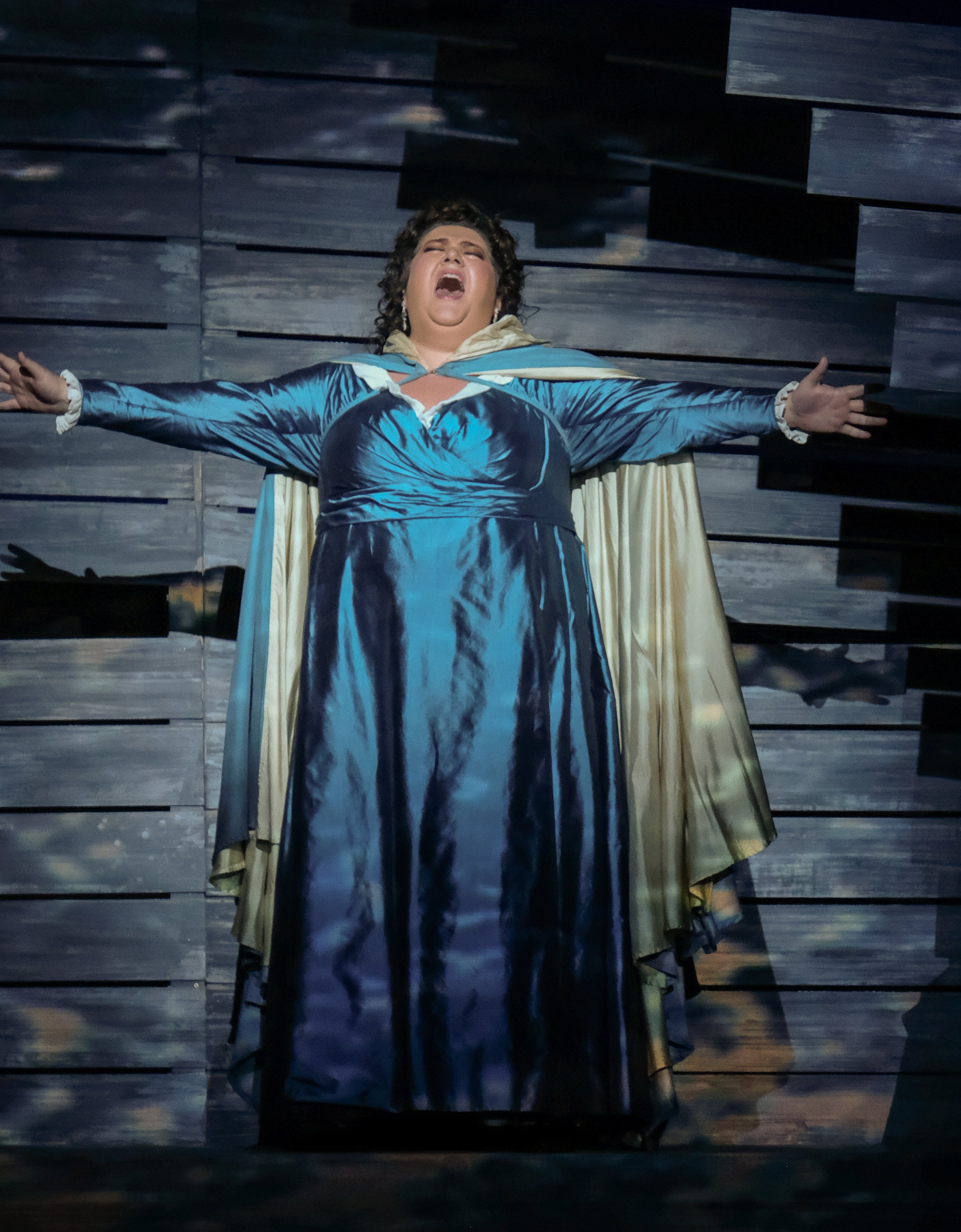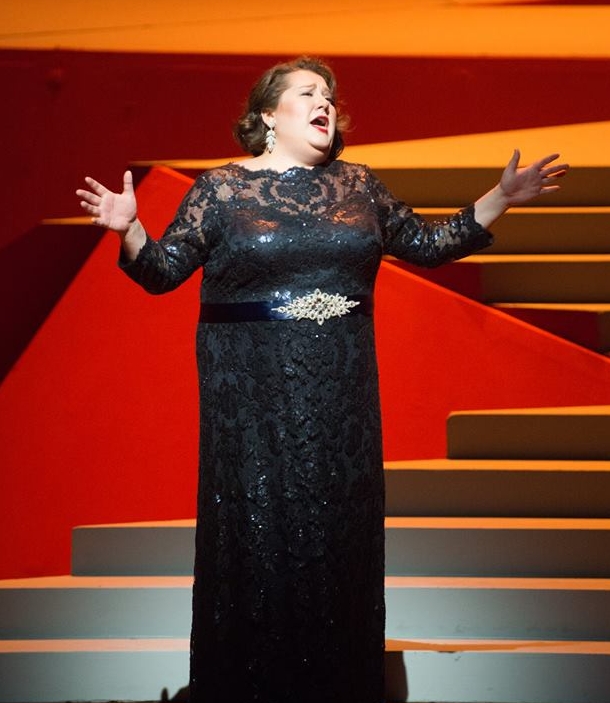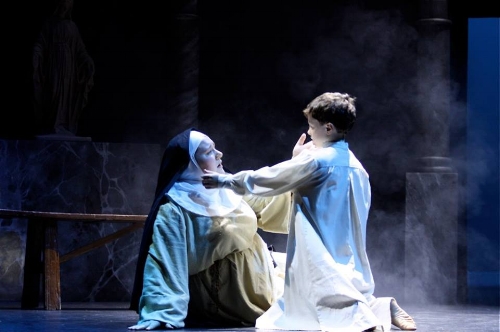Press
Schoenberg’s Gurre-Lieder with the American Symphony Orchestra
“Felicia Moore’s soprano is cut from the vocal cloth that gets a Wagnerian’s pulse racing. Her resplendent voice soared effortlessly over the massive orchestra at any volume. In Tove’s final song where she rhapsodizes on death, Moore’s voice was radiant as she sang of a final ecstatic kiss. Her glorious sound, together with sparkling playing from the orchestra and complete with cascades of swirls from the harps, made it the most magical moment of the performance.” Rick Perdian, Seen and Heard International
“…the Wagnerian vocal styling of soprano Felicia Moore as Tove suited the role, flexible and beguiling…” David Wright, New York Classical Review
“Felicia Moore as Tove brought a bright, powerful soprano that rang out in sharp relief.” Jon Sobel, BlogCritics
“Soprano Felicia Moore possesses a large, blooming voice, that managed to break through the orchestral cacophony...Her Tove was exotic and warm.” Ben Weaver, Oberon’s Grove
“The excellent soprano soloist, Felicia Moore, remained distinctly audible…[she] sang with lush, richly sonorous and seamless tone as Tove…the voice is absolutely first-rate and the technique impeccable.” Eli Jacobson, Parterre Box
Barber’s Knoxville: Summer of 1915 with The Cleveland Orchestra
“Soprano Felicia Moore made a compelling protagonist, singing with luminous color and nuanced expression. Working seamlessly with a supple orchestra under Mälkki, she turned in a captivating performance that stuck the landing in every sense.” Zachary Lewis, cleveland.com
The Metropolitan Opera’s Lady Macbeth of Mtsensk
“Felicia Moore's imposing soprano lent stature to Aksinya, Sergei's first assault victim.” David Shengold, Opera News
“Felicia Moore’s potent appearances as the abused cook, Aksinya, were memorable…” Robert Levine, Bachtrack
Opera Maine’s Der fliegende Holländer
“Felicia Moore was a superb Senta: her Act II ballad, “Traft ihr das Schiff,” was by turns, vehement, terrifying and deeply compassionate, and she brought sufficient power to match Delavan in their lengthy Act II duet.” Allan Kozinn, Opera News
“Moore’s performance of Senta’s famous romantic ballad was a highlight of the evening with its exquisite melody enhanced by the fine, Israel Gursky-conducted orchestra’s evocative swells.” Steve Feeney, Portland Press Herald
“In a night of such stellar singing, it is difficult to pick out a single performance as “the one,” but I’m going to do just that. Felicia Moore shook the house with Senta’s pent up passion and obsessiveness over the Dutchman’s portrait hanging above the fireplace mantel. Before her ballad, she ran across the stage, beneath a pair of porticos, striking a frieze-like pose before launching into the tale of the Dutchman’s curse. Here was a voice equal parts lava and silk. The size of the sound was thrilling, with absolutely secure placement, a beautiful warm, and even vibrato, excellent diction and coloring of text. While trying to stay in the moment, I could not help but think what a sensational Ariadne Ms. Moore would be.” pArts blog
New Orleans Opera’s Die Walküre, Act One
“Soprano Felicia Moore was a sumptuous Sieglinde, her singing rich and secure in all registers. “Du bist der Lenz” built to a wonderful climax in one of many highlights of the afternoon…All three artists paid particular attention to Wagner’s text, bringing a welcome sense of theater to the performance.” George Dansker, Opera News
Heartbeat Opera’s Lady M
“Soprano Felicia Moore’s reading of Lady Macbeth’s “Vieni, t’affretta” was riveting. She recited Macbeth’s letter in Shakespeare’s English; when she launched into the aria itself, her forceful attack registered as a call to action. Moore’s soprano exhibited both scale and focus; in its lower reaches, it suggested the dark forces propelling Verdi’s antiheroine. The trills fell exactly into place; the articulation of the polacca rhythms was both accurate and tremendously exciting. Moore was performing in her childhood bedroom at her family’s house in New Jersey, but she managed to turn her mundane surroundings into a place of high drama. Her singing of the Sleepwalking Scene in the subsequent music video confirmed the good impression she made in “Vieni, t’affretta”.” Fred Cohn, Opera News
"And each of the performances — from soprano Felicia Moore, who powerfully realizes her Lady M from her own childhood bedroom, to baritone Quentin Oliver Lee, whose Macbeth brings sound and fury — manage to reach through the screen.” Michael Andor Brodeur, The Washington Post
“Moore’s turn in the limelight, singing Lady Macbeth’s entrance aria, “Vieni! T’affretta!…” demonstrated her ability to bring the gravitas of tone to the power-hungry queen. Her strikingly rich sound, full of dark, dramatic flair was captivating.” Chris Ruel, Opera Wire
“The two prerecorded videos were gripping, especially Ms. Moore’s sleepwalking scene, which found high drama in her vibrant soprano…and the video component she filmed herself. A video editor did the careful layering of images— hand washing in multiple sinks, shadowy corridors, candles— but Ms. Moore’s choices drove the scene.” Heidi Waleson, Wall Street Journal
“The show closed with a “music video,” of Felicia Moore singing Lady Macbeth’s Sleepwalking aria, compiled out of footage taken by the cast and crew with whatever they could find on hand. Moore, who I simply loved as Susan B. in The Mother of Us All at the Metropolitan Museum of Art in February, did a bang-up job, considering the circumstances, her enormous voice sounding warm and strong on the recording. I am a Felicia Moore fan, and I can’t wait to hear and see her in this role. As Susan B., she exuded strength, grace, and power, and I can only imagine how fascinating she’ll be with a little pure-evil added to the mix as Lady Macbeth.” Gabrielle Ferrari, Parterre Box
“Soprano Felicia Moore as Lady Macbeth has a captivating voice, powerful and rich with color. Her early Lady M aria sung in her childhood bedroom, and the video of the sleepwalking scene (“Maledetta”) were excellent, giving her the chance to fully display the colors, texture, and emotionality of her voice. Wow.” Michael Rogers, OperaGene
“The first performance was by Moore as Lady Macbeth, singing her entrance aria. She sounded spectacular, fearless, secure, she’s got a real voice. The last segment was a fully produced short film/music video of Moore performing Lady M’s sleepwalking scene. Again, Moore was extraordinary. As a longtime opera queen, I was looking out for the high D-flat at the end, and it was supreme.” Christopher Ryan, DivaMensch
MetLiveArt’s The Mother of Us All
Photo: Stephanie Berger
“Soprano Felicia Moore’s catalytic performance as Anthony was the driving force behind this grand collaboration. From the moment Moore entered The Met’s American Wing, wearing Anthony’s quintessential black dress uniform, one might have felt the weight of a life’s promise for a better world, which Moore brilliantly channeled throughout her entire performance. Moore’s understanding of Anthony’s life was supremely told and examined through the colors and tone of her voice. She sang not only with conviction as Anthony, but also with hope for modern day. Moore’s palate of emotional depth was limitless in its ability. One might say this was Moore’s initial performance of a lifetime and the potential foretelling of an opera magnate career ahead.” Jennifer Pyron, Opera Wire
“Felicia Moore’s opulent, Wagner-scaled soprano could probably have dispensed with the amplification. She captured Susan B.’s determination as well as her exhaustion…” Heidi Waleson, Wall Street Journal
“I wonder if there was fear in the hearts of anyone at the Metropolitan Museum when the decision was made to let the Juilliard staging of the Gertrude Stein-Virgil Thomson opera The Mother of Us All use the Engelhardt Court of the American Wing, as part of the MetLiveArts series. No, not because of the difficulties of dealing with the acoustics of the mammoth space--no small issue for singers and orchestral musicians to maneuver in--but whether the huge glass ceiling could sustain the power of soprano Felicia Moore's voice without shattering into a million pieces…Moore was spectacularly fine as Anthony, modulating her huge instrument as called for--from a whisper to nearly Wagnerian--and using her finely tuned acting skills. Her combination of intensity and strength with delicacy was remarkable.” Richard Sasanow, Broadway World
“Yet Felicia Moore in the lead role of Susan B. Anthony unquestionably dominated, purely on account of her extraordinary voice, with its seamless registers, equally powerful and plangent high and low notes, and authoritative projection at every dynamic level. Perhaps Moore’s stately, majestic portrayal transforms her character into a remote goddess rather than the determined coalition builder and activist, but that’s like complaining that Niagara Falls has too much water.” Jed Distler, Classics Today
“Mais il faut évidemment réserver une révérence particulière à Felicia Moore dans le rôle de Susan B. Anthony, destiné à un soprano dramatique ou à une mezzo. Par l’ampleur de la voix et la rondeur de son timbre profond, par l’autorité de son chant et la maîtrise avec laquelle elle assume un rôle écrasant (elle est presque constamment en scène), cette jeune soprano américaine porte une grande partie du spectacle sur ses épaules, et l’on peut supposer que sa carrière ne restera pas longtemps cantonnée aux petites salles des Etats-Unis.” Laurent Bury, Wanderer
“The overall impression at the opening on Saturday evening was of grandeur…particularly given the lustrous, commanding soprano Felicia Moore, who sings Susan B. Anthony, not wrongly, like the heiress to Wagner’s Isolde and Strauss’s Ariadne. Ms. Moore scales down her gleaming voice for the work’s many intimate passages, but this is still an enactment of Susan B. as mythical goddess.” Zachary Woolfe, The New York Times
“The whole enterprise centered on Juilliard alumna Felicia Moore, a genuine jugendliche dramatische soprano of exciting potential (and present accomplishment). Giving sharp profile to Susan B.’s moods and utterances, Moore soared through her testing music with stunning beauty and accuracy, heroically anchoring a memorable evening.” David Shengold, Opera News
“Felicia Moore was spellbinding as Susan B., her enormous voice and expressive face carrying the evening, conveying a woman who, even as she creates it, is already thinking about how she will fit into to history. She knows she’s right; women must have the vote. She tirelessly debates men whom she knows will never vote her laws. She answers their every call to speak. But, as she says in her final scene, when she appears as a ghost, singing from her unveiled statue: “Do we want what we have got? Has it not gone? What made it live? Has it not gone because it is had?” Moore handled these shifts in mood, from self-doubt to staunchness, with honesty, warmth, and a hint of irony. She’s got a powerful voice…searing and wall-shaking at its heights. Her best moments were when she got to rein it in, showing her ability to sing with grace, clarity, and tenderness.” Gabrielle Ferrari, Parterre
“The cast of singers from The Juilliard School’s Ellen and James S Marcus Institute for Vocal Arts was headed up by Felicia Moore, who as Anthony carried most of the weight of the production. With a strong voice and articulate delivery and showing the slightest bits of bemusement, exasperation, persistence and a pervading wisdom, she was a convincing and considerable heroine. Stein is a pleasure to read and at least quadruple the pleasure to hear spoken or sung. To hear her making a political argument, taking a position, is a fantastic dissonance, the repetitions based not on conviction but Stein’s own maddening, fascinating semantic obsession. And Moore’s clear delivery of the circuitous lines (“I understand that you undertake to overthrow my undertaking”) was a pleasure, even with the supertitles.” Kurt Gottschalk, Bachtrack
“Moore is commanding, her powerful soprano warmly burnished in the lower and middle registers and clarion at the top.” Clive Paget, Musical America
“Felicia Moore, a [Juilliard Marcus Vocal Arts] Institute alumna, is the terrific Susan, with a soprano and presence of Wagnerian authority.” John Rockwell, Financial Times
International Meistersinger Akademie
"Fertig mit dem Master-Studium bei Edith Wiens in New York ist Felicia Moore. Mit wenigen Bewegungen und blitzenden Blicken unterstüzt sie die Wirkung ihrer fulminanten Stimme als "Freischütz"- Agathe: ein jugendlich-dramatischer Sopran mit viel Potenzial- da bebt der Reitstadel." Neumarkt in der Oberpfalz Newspaper
"Dafür aber im deutschen Repertoire zwei räum- und rollenfüllende Sängerinnen mit besten Karriere-Aussichten: absolut souverän und mit triumphaler Höhe sang Felicia Moore, die dieses Jahr ihren Master bei Edith Wiens in New York gemacht hat, die große Arie der Ariadne von Richard Strauss. Dem war nichts hinzuzufügen." Neumarkt in der Oberpfalz Newspaper
Heartbeat Opera's Don Giovanni
"Felicia Moore (Donna Elvira) stood out among a cast of capable voices. She managed Elvira’s leaping coloratura accurately, led the orchestra with clear diction, and sculpted notoriously challenging phrases expressively. She sang spontaneously within the rigid demands of Mozartian style." Jeremy Hirsch, Schmopera
"Felicia Moore brought a steely fury to Donna Elvira." Heidi Waleson, The Wall Street Journal
"Elvira was still a vengeful fury, but her abiding lust for Giovanni constantly battled for dominance, and one got the sense that if she did successfully excise his heart, she might eat it. Felicia Moore’s Elvira offered the ideal mix of steel, beauty and vehemence." Joanne Sydney Lessner, Opera News
"Donna Elvira (George London award-winning soprano Felicia Moore) was substantial in every way, vigorously demanding vengeance and warning off the flailing Donna Anna." Leslie Kandell, Classical Voice America
"Amongst a cast of excellent performances, Felicia Moore as Donna Elvira deserves a special nod not only for the range of her singing, but also for the range of her emotions." Steven Pisano, Feast of Music
"Vor allem die Frauen (waren) gut...Felicia Moores klangvoll-bewegender Elvira." Wiebke Roloff, Opernwelt
"The best things about the musical performance were the three principal women, Leela Subramaniam, Felicia Moore and Samarie Alicea." John Rockwell, Financial Times
"And the most well-sung of the three in this production, soprano Felicia Moore’s Donna Elvira was more than a harping shrew, but a woman deserving of respect." Joel Rozen, Parterre
Schwabacher Debut Recital
“Moore’s voice [was] transfixing, marked by tonal brilliance and emotional eloquence." Joshua Kosman, SF Gate
"Merola may have trained both Pursell and Moore for opera, but neither of them showed the slightest difficulty in applying their technical skills to an art song setting. Indeed, both of them clearly knew how to use body language to capture those narrative elements reflected in each of Tieck’s
poems." Stephen Smoliar, The Rehearsal Studio
Merola Opera Program
"Darker-toned soprano Felicia Moore as Agathe...won a knockout in [Der Freischütz], filling the dry acoustics of the Hall with a limpid tone that still bloomed with color." Philip Campbell, Bay Area Reporter
"The concert yielded [a] standout performance by Felicia Moore as Agathe in Freischütz." Georgia Rowe, The Mercury News
"'Dich, teure Halle' was brilliantly sung by soprano Felicia Moore." James Roy MacBean, The Berkeley Daily Planet
Juilliard Opera's Katya Kabanova
"Felicia Moore unfurled a striking instrument as Kát'a, using a pronounced vibrato to cut through the orchestra but retaining pure sound on sustained phrases. She moved well and proved a skilled vocal actress, layering the character's temptation and guilt." David Shengold, Opera News
"In this role, soprano Felicia Moore provided a complex and nuanced portrait of this troubled girl who becomes a woman and finally, a tragic heroine in the opera's final pages. Ms. Moore had the acting equipment to play Kát'a's voyage of self-discovery. This came out in the two big Act II duets with her sister-in-law Varvara and her lover Boris. In the great final liebestod that comes before her watery death, Ms. Moore proved unafraid of the role's upper reaches and elevated this simple story from family drama to genuine pathos." Paul J. Pelkonen, Culture Magazine
"The emotional complexities came through strongly on Friday night...and not just because the soprano Felicia Moore, as Katya, sang so expressively...She was at her best during the final scene, when the guilt-ridden, distraught Katya imagines her grave being visited by birds and then drowns herself in the river." Anthony Tommasini, The New York Times
"As Káťa, the woman trapped in an unhappy marriage who falls in love and can’t cope with the consequences of her actions, soprano Felicia Moore had great presence and displayed a powerful and flexible voice...she conquered with ease the difficulties of the score... Moore’s interpretation announces a talent to be followed closely." Edward Sava-Segal, Bachtrack
"Felicia Moore lent a tangy lyric soprano and sympathetic presence to the eponymous Katya’s soaring, then pained daydreams of flying and romantic love; savoring of her ‘illicit,’ impassioned tryst with Boris, when Tichon is away; conveying her guilt and then confessing, to the forgiving—and not—Tichon and implacable Kabanicha; and finally, bringing pathos to her suicide aria, before she jumps into the Volga River." Bruce-Michael Gelbert, [Q] on Stage
Opera Theatre of Saint Louis' Emmeline
"[James] Robinson’s signal achievement here lay in the performances he drew from his cast: this was a true acting ensemble, working to bring Emmeline’s drama to life...As Emmeline’s sister, Harriet, Felicia Moore (a member of OTSL’s Gerdine Young Artist program) offered a vivid study in petulant malice." Fred Cohn, Opera News
"As the mean-spirited sister Harriet, Felicia Moore was every inch the woman-we-love-to-hate. Her solid singing was tinged with spite and provocation." James Sohre, Opera Today
Mannes Opera's Double Bill
Suor Angelica & Gianni Schicchi
“Senza mamma, o bimbo, tu sei morto!” She sang, throwing her hands up to the sky. The...pain in her voice gathered strength and, upon hitting a high devastating note, cascaded through the Kaye Playhouse at Hunter College. Her grief lingered as the audience erupted in thunderous applause. The aria was one of many heart-stopping moments. Moore's expressive singing brought the character’s breakdown to life." The New School Blog
"Gianni Schicchi was pretty close to perfect...The singers playing Buoso Donati’s grasping relatives crafted uniquely quirky characters within a vividly drawn family dynamic, and they also played off one another like a well-oiled ensemble...Felicia Moore was an amusingly single-minded Nella, and her gleaming soprano stood out in the women’s trio." Joanne Sydney Lessner, Opera News
Barber's Knoxville: Summer of 1915
"The soprano was Felicia Moore, who deserves a paragraph to herself. This New York-based vocalist has a powerful upper register and a dark richness of timbre that is unusual in a dramatic singer this young. At times, one is reminded of the lushness of the best mezzo-sopranos. Also, one felt she was matching her sound to the intimate acoustic space of the Kittredge Theatre and holding in reserve even more power to let loose in a large opera house. Here is an impressive young artist to watch for in the future." Ted McIrvine, CVNC Journal
Mannes Opera's The Rape of Lucretia
"It is easier to accept those choruses [in The Rape of Lucretia] when they are performed by artists as firm-voiced and thoughtful as...the soprano Felicia Moore." Zachary Woolfe, The New York Times















